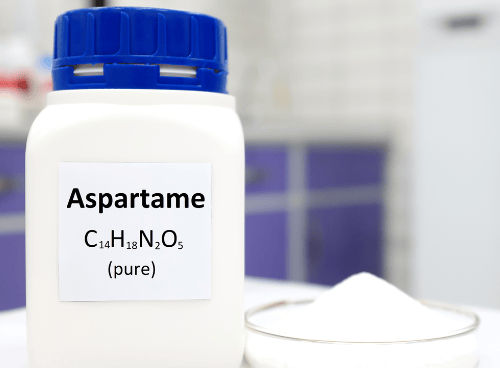How Safe Is Aspartame for You?
Aspartame is generally considered safe for most people when consumed within established guidelines. Extensive research and regulatory assessments, including those by the FDA and EFSA, support its safety. However, individuals with the rare genetic disorder phenylketonuria (PKU) should avoid aspartame, as they cannot metabolize phenylalanine, a component of aspartame. If you have concerns, it's best to consult with a healthcare professional.


What Is Aspartame?
Aspartame is an artificial sweetener used in many low-calorie and sugar-free products. Discovered in 1965, it is about 200 times sweeter than sugar. Chemically, it is a dipeptide composed of two amino acids, aspartic acid and phenylalanine, along with a methyl ester group. Aspartame provides sweetness without the calories associated with sugar.
Products With Aspartame
Aspartame is widely used in a variety of food and beverage products, including:
Diet sodas: Common in beverages marketed as diet or zero-calorie.
Sugar-free gum: Used to provide sweetness without contributing to tooth decay.
Sugar-free desserts: Found in low-calorie versions of ice creams, puddings, and other desserts.
Sugar-free yogurt: Used in some yogurt products to reduce calorie content.
Tabletop sweeteners: Marketed under brand names such as Equal, NutraSweet, and Sugar Twin.
Aspartame and Weight Loss
Aspartame is often used as part of a weight management strategy due to its low-calorie content. By replacing sugar with aspartame, individuals can reduce their overall caloric intake, potentially aiding in weight loss or weight maintenance. Studies suggest that using low-calorie sweeteners can be effective in reducing energy intake when used in place of higher-calorie options (Rogers et al., 2016).
However, some research indicates that the relationship between artificial sweeteners and weight loss is complex. There are concerns that artificial sweeteners might affect appetite regulation, potentially leading to increased food consumption and weight gain in some individuals (Swithers, 2013).
Aspartame and Diabetes
Aspartame can be beneficial for individuals with diabetes as it does not raise blood glucose levels. Replacing sugar with aspartame can help people with diabetes enjoy sweet-tasting foods and drinks without the associated spike in blood sugar. The American Diabetes Association recognizes aspartame as a safe alternative to sugar for people with diabetes (American Diabetes Association, 2019).
However, it's important for individuals with diabetes to monitor their overall diet and manage their carbohydrate intake from all sources, including foods containing aspartame.
Risks of Aspartame
Despite its widespread use, aspartame has been the subject of controversy and scrutiny regarding its safety. Here are some of the potential risks and concerns:
Phenylketonuria (PKU)
Individuals with phenylketonuria (PKU), a rare genetic disorder, cannot metabolize phenylalanine, one of the components of aspartame. As a result, they must avoid aspartame-containing products to prevent harmful levels of phenylalanine from accumulating in their bodies.
Cancer Risk
There have been concerns about a potential link between aspartame and cancer. Some animal studies have suggested a possible association, but extensive reviews by regulatory agencies, including the U.S. Food and Drug Administration (FDA) and the European Food Safety Authority (EFSA), have concluded that aspartame is safe for human consumption at current levels of use (Magnuson et al., 2007).
Neurological Effects
Aspartame has been alleged to cause neurological symptoms, such as headaches, dizziness, and mood changes. However, scientific evidence supporting these claims is limited. Most studies have found no significant association between aspartame consumption and adverse neurological effects (Butchko et al., 2002).
Metabolic Effects
Some studies suggest that artificial sweeteners, including aspartame, may impact metabolic health and gut microbiota. However, findings are inconsistent, and more research is needed to fully understand these effects (Palmnäs et al., 2014).
Conclusion
Aspartame is a widely used artificial sweetener that offers a low-calorie alternative to sugar. It can be beneficial for weight management and diabetes control. While generally recognized as safe by major health authorities, it is not without controversy. Individuals with PKU should avoid it, and some people may experience adverse effects. As with any food additive, moderation and personal sensitivity should be considered.
References
American Diabetes Association. (2019). Nutrition Therapy for Adults with Diabetes or Prediabetes: A Consensus Report. Diabetes Care, 42(5), 731-754. https://doi.org/10.2337/dci19-0014
Butchko, H. H., Stargel, W. W., Comer, C. P., Mayhew, D. A., Benninger, C., Blackburn, G. L., ... & Leon, A. S. (2002). Aspartame: Review of safety. Regulatory Toxicology and Pharmacology, 35(2), S1-S93. https://doi.org/10.1006/rtph.2002.1542
Magnuson, B. A., Burdock, G. A., Doull, J., Kroes, R. M., Marsh, G. M., Pariza, M. W., ... & Williams, G. M. (2007). Aspartame: A safety evaluation based on current use levels, regulations, and toxicological and epidemiological studies. Critical Reviews in Toxicology, 37(8), 629-727. https://doi.org/10.1080/10408440701516184
Palmnäs, M. S. A., Cowan, T. E., Bomhof, M. R., Su, J., Reimer, R. A., Vogel, H. J., & Shearer, J. (2014). Low-dose aspartame consumption differentially affects gut microbiota-host metabolic interactions in the diet-induced obese rat. PLoS ONE, 9(10), e109841. https://doi.org/10.1371/journal.pone.0109841
Rogers, P. J., Hogenkamp, P. S., de Graaf, C., Higgs, S., Lluch, A., Ness, A. R., ... & Mela, D. J. (2016). Does low-energy sweetener consumption affect energy intake and body weight? A systematic review, including meta-analyses, of the evidence from human and animal studies. International Journal of Obesity, 40(3), 381-394. https://doi.org/10.1038/ijo.2015.177
Swithers, S. E. (2013). Artificial sweeteners produce the counterintuitive effect of inducing metabolic derangements. Trends in Endocrinology & Metabolism, 24(9), 431-441. https://doi.org/10.1016/j.tem.2013.05.005
